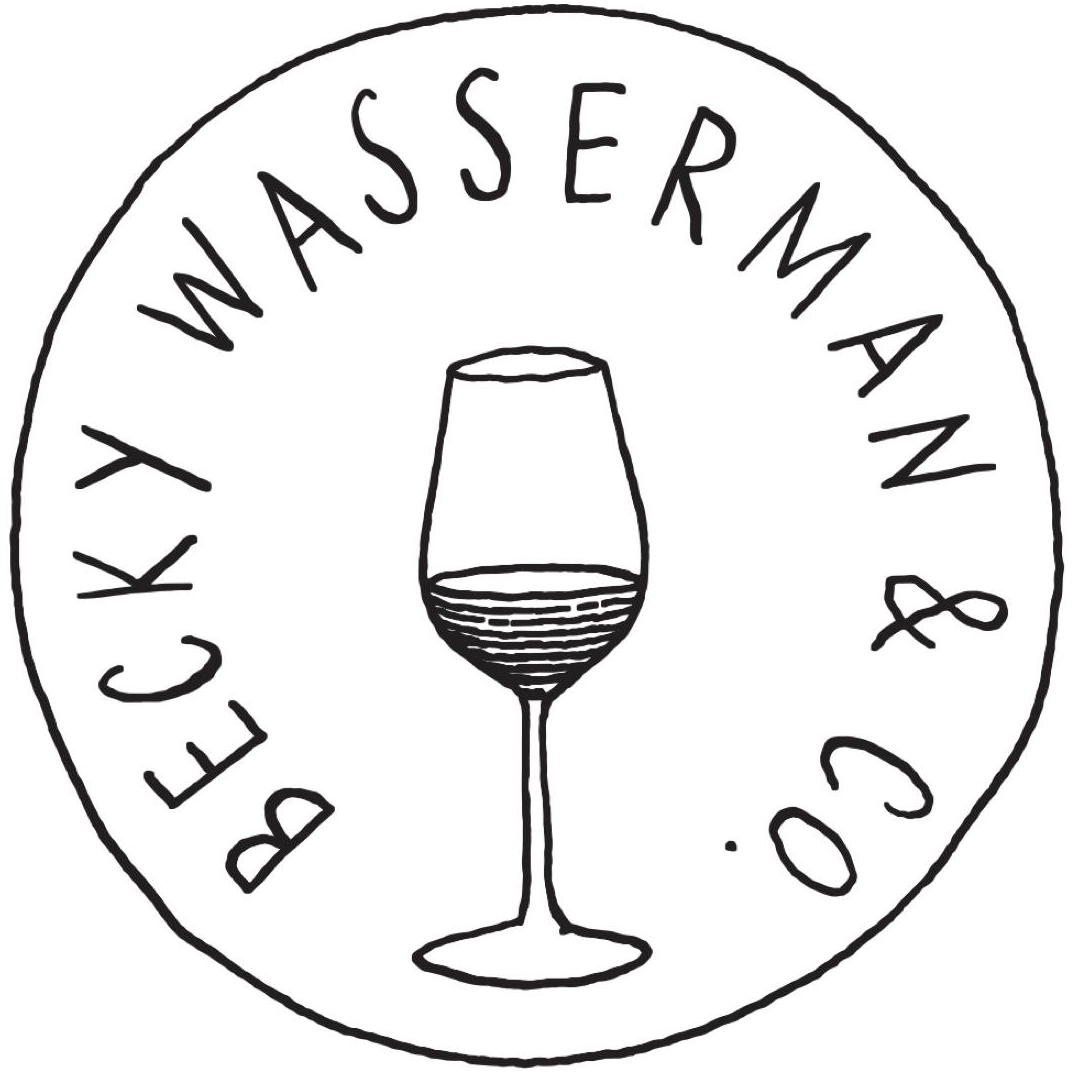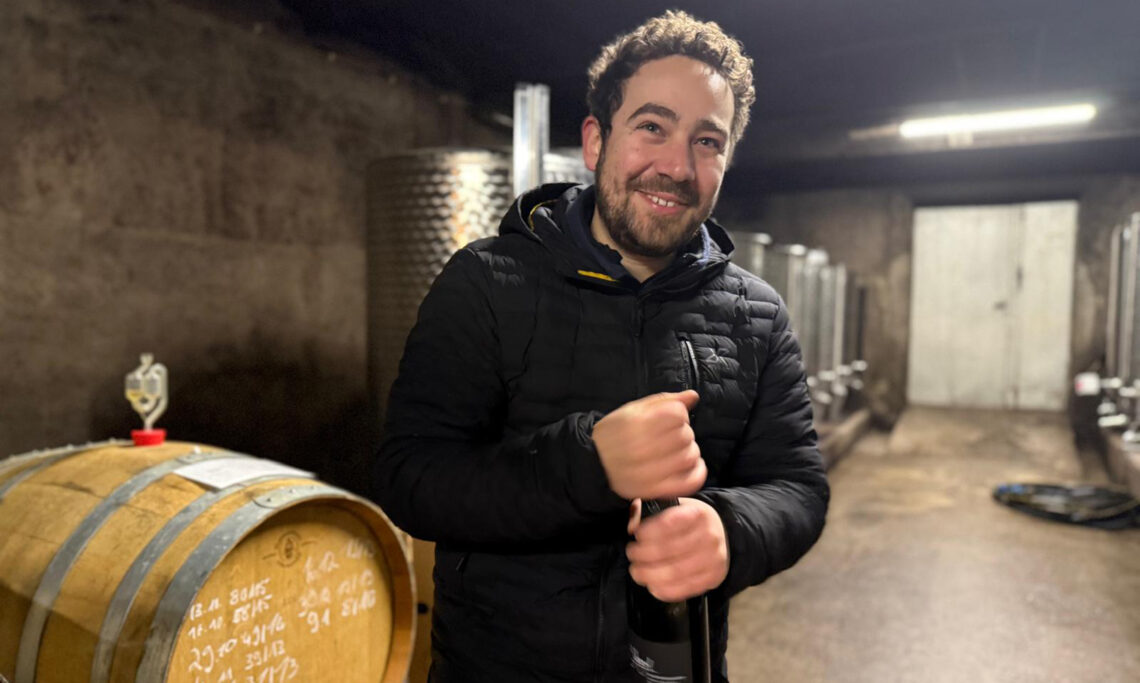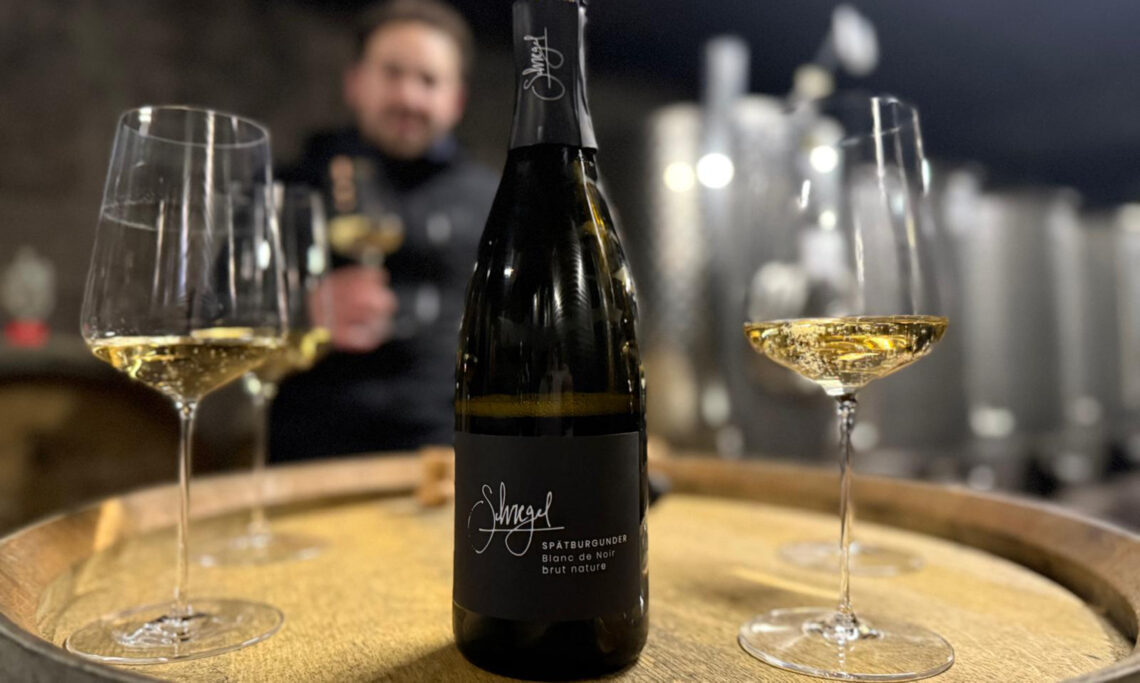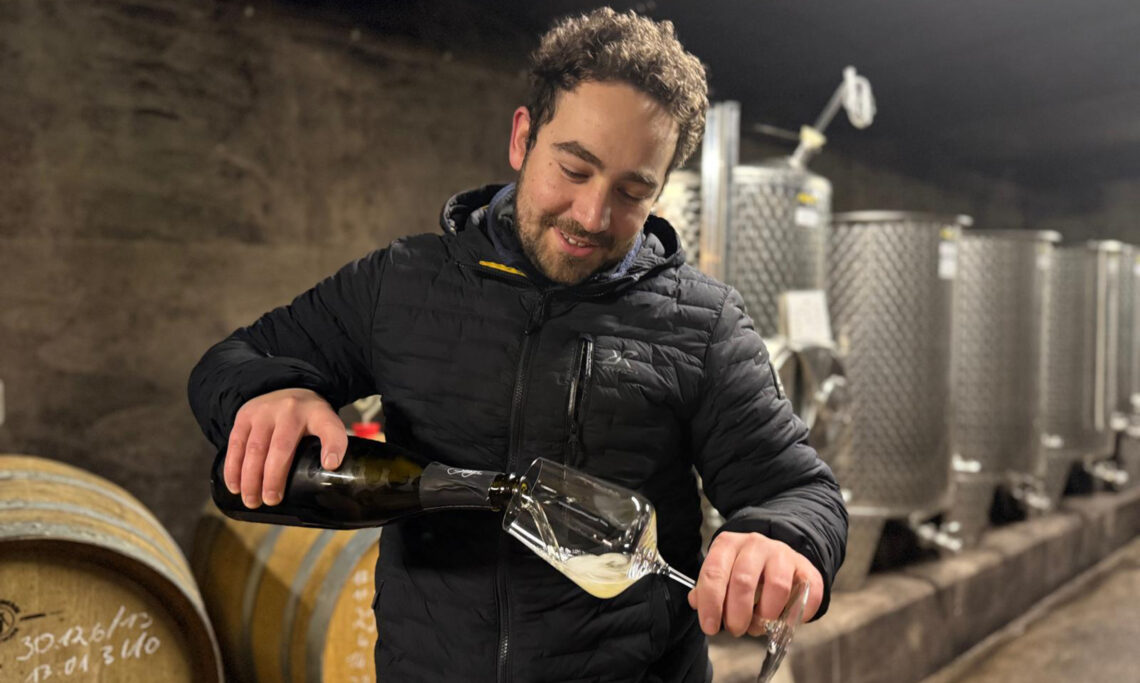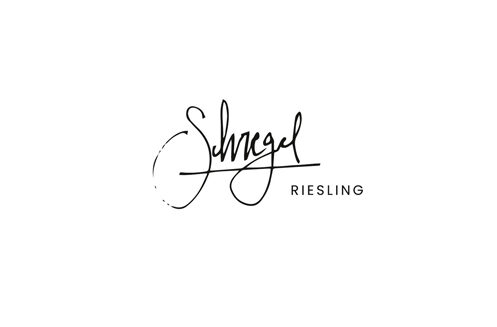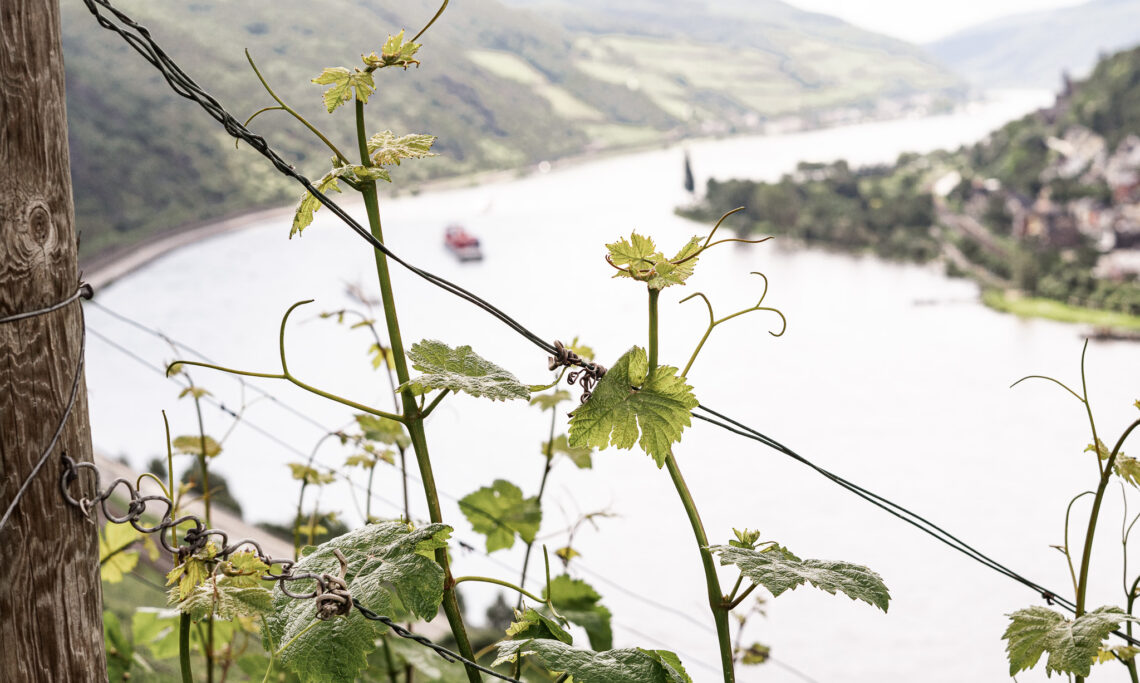Domaine Profile
- Location: Rüdesheim, Rheingau, Germany
- Varieties: Riesling
- Surface Area: 4.0 ha (9.88 ac)
- Viticulture: Organic (not certified), biodynamic methods
- Vinification: Long, gentle pressing with whole clusters, settled overnight, ambient yeast fermentation and aging for 7-10 months on the lees in stainless steel tanks and a single used barrel (Rüdesheim Bischofsberg), no temperature control, no blocked malolactic conversions, no fining or filtration, SO2 added about 1 month before bottling (45-60 ppm total).
Schregel
This will sound odd: we were not looking for a Riesling producer in Germany.
Don’t get us wrong, we believe German Rieslings are among the greatest wines in the world. But the space devoted to the category is confined and the US importers doing it justice already have to elbow for room.
It wasn’t a hard no — we’re not idiots — but if we were to work with a Riesling producer, they’d better have something meaningful to add to the conversation.
In the exhilarating space between classic and natural wine, and after only three vintages, Alex Schregel has hit the nail on the head with such clarity it will draw from your lips a Hallelujah.
Riesling’s affinity with the crystalline does not hurt, nor do vineyards once considered as some of the greatest. But let’s not take away from the human: Alex Schregel, who has yet to turn 30, is an immensely compelling talent in a region whose terroirs might be the most deserving of a Renaissance.
Biography
Alex was born in the Rheingau in 1996. His grandfather owned a winery and his father has been the technical director at Künstler since 2003.
Alex studied viticulture and enology in Geisenheim and apprenticed with Rebholz, Leitz, Fürst, and Künstler. After graduating, in 2018, he was hired at Leitz where he quickly worked his way up to technical director. With Leitz now farming 160 hectares, it’s a big job for such a young man.
Compelling stories usually contain some form of injustice that sets the rebellious hero on the quest. There will be none of that natty braggadocio here. Alex is the nicest and least chest-thumping vigneron you will meet. He is very happy at Leitz, proud of his region, gets along wonderfully with his family, and is respectful of other vignerons. He even expresses with admirable mildness his annoyance at the official tasting panel that regularly abuses his wines.
Alex didn’t even have plans to make still wines of his own. Because he loved bubbles, he made a little sparkling wine for fun in 2020. But in 2021, he was offered a lease on some small parcels in two serious terroirs in Rüdesheim: Bischofsberg and Roseneck. It was too great an opportunity to resist, “and I wasn’t going to make Sekt with grapes of that caliber,” he says.
The Rheingau
From the middle of the nineteenth century and for more than a century after that, not only was the Rheingau considered to be the greatest wine region in Germany, it was thought to produce some of the greatest white wines in the world.
Just as one example of a copious amount of testimony, in the 1950s, Frank Schoonmaker, the legendary US wine importer (and ex-spy for the OSS) wrote, “This is the Rheingau—the Weingau, as the Germans call it—and among the celebrated viticultural districts of the world, it has the Burgundian Côte d’Or for its only real rival.” The region was so dominant that the British wine trade used to call all Rhine Riesling Hock, after Hochheim in the Rheingau — Russell still does.
When in the 1980s it just fell off the face of the earth, it was as if something as important as the Côte de Nuits had packed up and gone camping, never to be seen or heard from again.
It was not an injustice, the Rheingau only had itself to blame. As Terry Theise explains, “It took a generation of indifferent and downright crummy wines from most of the erstwhile great names of the region to throttle its reputation to death.”
Remains of its past glory are occasionally found today but only as flotsam from a wreckage — the biodynamic wines of Eva Fricke and Peter Jakob Kühn, a bottle of Breuer with age... For the most part, though, the Rheingau remains hopelessly staid, in a self-imposed exile to the pages of antiquarian wine books. The Steinberg, one of its most glorious crus, was planted and walled by the Cistercian monks just like the Clos de Vougeot. But unlike the Burgundian clos, in the parking lot just outside the Steinberg’s wall you can buy bottles of its latest vintage from a vending machine.
So when we were alerted to Alex by Tomoko from Chanterêves and tasted the bottles she graciously brought to our office, our jaws dropped. The wine trade too often and too self-importantly claims discovery but Alex’s wine did make us feel as if we were Indiana Jones.
Farming and Winemaking
As we have mentioned, Alex is happy at Leitz. His domaine is purposefully a side project for which he organically farms four hectares. Many of the vineyards are very steep and require the work to be done by hand or with a small caterpillar. “There is also a biodynamic idea, but I don’t want to say I farm biodynamically because I don’t know enough about it yet,” Alex says.
Apart from drought in the steep vineyards, climate change is still acceptable in the Rheingau. Temperatures have not risen to extremes even if they are warmer throughout the year. Thanks to this, “a little like Breuer, I pick earlier than most others here,” Alex says, “and with the warmer climate, I still have flavorful grapes. I want maximum 12.5 ABV, 12 is even better.”
Where he stylistically fits in the world of German Riesling is not a crowded place.
Even when they farm organically, the overwhelming majority of great Riesling producers remain interventionist winemakers. Yeasts are not always ambient, SO2 levels are high and added throughout, temperatures are controlled, malos are blocked, and filtration is tight.
Alex presses whole clusters without crushing them for about 2.5 hours, then lets the juice settle overnight. It’s a light pressing, closer to what he does for sparkling wine, to avoid extracting tannins and to keep the juice clear. He then racks to stainless steel tanks with a moderate amount of lees in an effort to mitigate reduction. Vinification and aging take place in stainless steel tanks except for a single used barrel. The above preserves the quality Alex most admires in classic German Riesling, its crystalline nature.
But his bent knee to the past stops there.
He ferments with ambient yeast and no temperature control. He does not block malolactic fermentation. He adds SO2 only once, approximately one month before bottling, aiming for 45 to 60ppm total (less than half the norm in the region). On this, he is not dogmatic. He hasn’t had to so far but he is not against adding SO2 earlier should the need arise.
Alex has decided to focus on three villages: Rüdesheim, Hallgarten and Lorch. From each, he wants to make village and cru wines. He credits his position at Leitz for enabling him to be stringent about what ends up in the bottle.
Despite his diminutive production, he has sold off wine in bulk because it didn’t taste exactly the way he wanted it to. “I am not earning my money [at my domaine],” he explains, “if it is not as good as I want it, I don’t bottle it.”
For the crus, he draws samples from the tanks and tastes them blind with his brother and father. What doesn’t match their exacting opinion of what cru-level wines should be ends up in the village wines.
After the selection, the wines are neither fined nor filtered. This is where Alex runs into trouble.
Qualitätswein, literally quality wines, are submitted to a local tasting panel for approval which comes in the form of a code, known as the AP number, short (thank god) for Amtliche Prüfungsnummer.
The tasting panel has on occasion rejected some of Alex’s wines, not because of any organoleptic flaws, mind you, but for visual reasons. Due to the lack of filtration, the wines weren’t totally, squeakily, neutered clear in appearance. 🤦🏼♂️
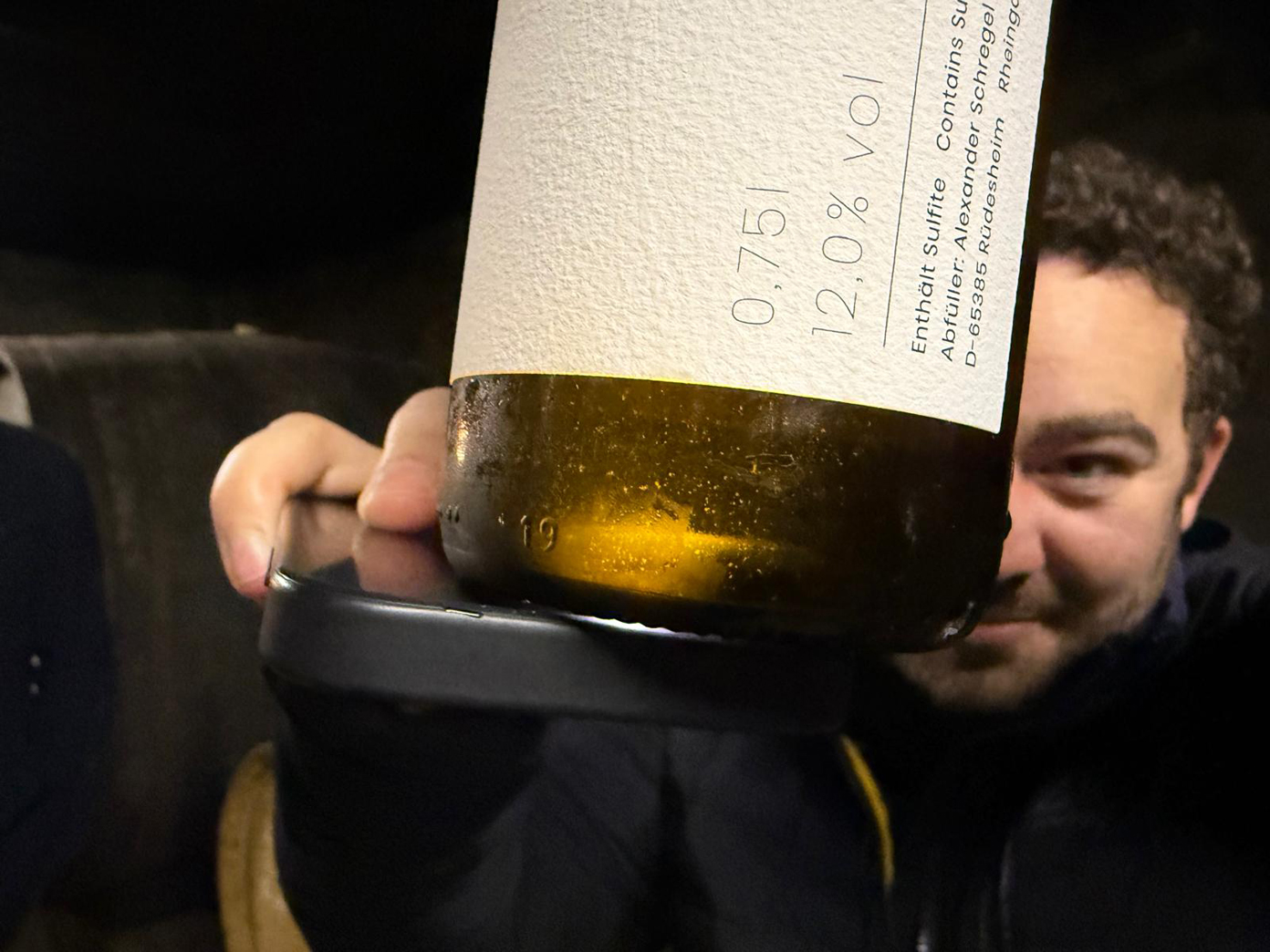
The punishment means a demotion from Qualitätswein to Deutscher Landwein, mere country wine, which is not allowed the mention of its birthplace, whether region, village or cru.
Alex rightfully feels he spares no effort to make qualität terroir-driven wines so he decided to leave the cru on the label but have his graphic designer cross it out to make it illegible.

It would be his Rage Against The Machine protest but for the fact that we don’t think Alex ever expresses rage. As we have mentioned, he is an exceptionally nice human.
Nevertheless, the demotion is absurd given that his wines texturally feel like elevated holistic classics: steely, linear, energetic, precise, refined, and saline, except that they are shorn of the dry grip and novocane of too much SO2.
As to aromas and flavors, however, Alex’s wines live on a different planet. On this planet, we have left the familiar Riesling land of peaches and nectarines for the land of umami—not the umami of natty wine per se because of his straightening reverence for the classics, but a more pristine world of its own.
Drink Schregel. It will make you feel like Indiana Jones and Captain Kirk.
